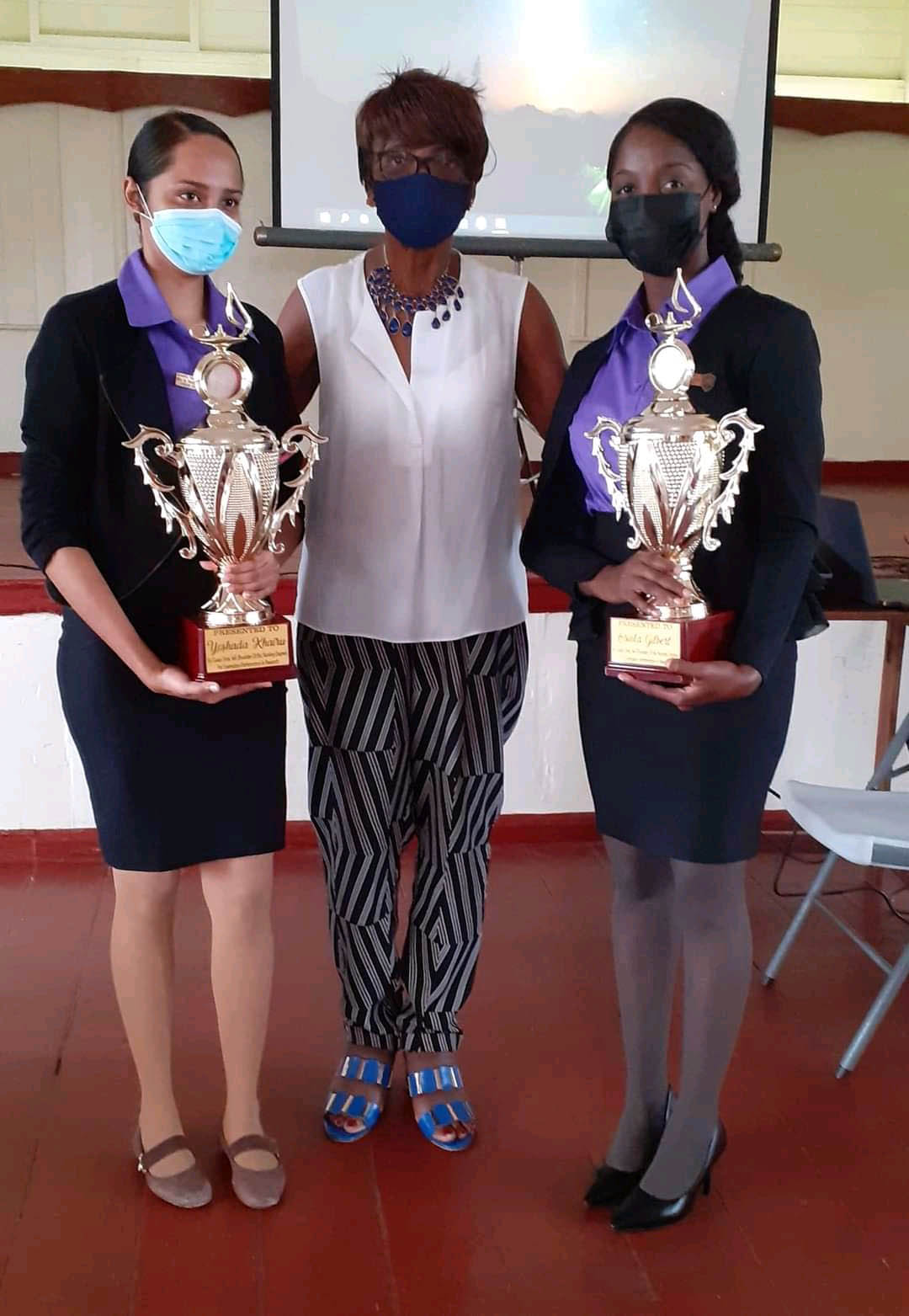Two young nurses working at a regional hospital saw abused women turning up to be treated daily and apart from helping to treat them they also wanted to understand the cause and effect of such violence.
So Osiola Gilbert-Chilcott and Yoshada Khairu, both nurses at the West Demerara Regional Hospital, decided to research the predictors of Intimate Partner Violence (IPV) within families of Zeelugt and Klien Pouderoyen, both communities in Region Three (Essequibo Islands-West Demerara).
Their research, which assisted them in successfully completing their bachelor’s degrees in nursing, identified some predictors and they have also made some recommendations which they hope can be used in addressing the issue in Guyana.

From the get go, the two knew their research was on track as following the presentation of their proposal to a panel that included then PAHO Country Representative Dr William Adu-Krow, it was selected to receive funding and guidance from that organisation. They were also assisted by Winifred Mardenborough-Razack, a lecturer at the University of Guyana. But nothing prepared them for their research being judged the best, resulting in them recently receiving the Gwen Tross Research Foundation Award through the Guyana Nurses Association.
Khairu told the Stabroek Weekend recently that initially they wanted to look at the prevalence of domestic violence but this was done before so they had the challenge of finding another topic and they then decided to look at the cause factors.

“The reason why we decided on that topic is because intimate partner violence is something that is prevalent not only in Guyana but also around the world… and so there are different reasons and different areas that you can hear persons are being abused by their spouse and even our death rate due to domestic violence is high,” Gilbert-Chilcott said.
Both of them live in Region Three, hence the decision to do their study in that region and based on statistics provided by the police, Zeelugt and Klien Pouderoyen had the most cases of domestic violence.
Researching this issue was expected to be challenging, but the two young nurses had even more difficulties thrown their way with COVID-19 becoming a reality in Guyana and the five-month impasse that followed the March 2, 2020 general and regional elections. Because of the latter issue, they had trouble getting to Georgetown to visit the PAHO Headquarters in Brickdam to receive the needed support.
“We had to bear up,” Gilbert-Chilcott said. “We had to say no we are not going to let this get to us, we need to focus on our studies and so we went despite all that was going on. We went to the office to get our guidance and support.”
The two researchers chose one village each, printed out questionnaires and visited homes which saw them receiving some 366 responses.
“We had to go out there to get the information…and it was challenging because persons did not want to come out and assist us and if persons were willing, we had to maintain the social distancing…,” Khairu said of their time in the field.
She shared that they were afraid going into the communities because of COVID as for them it was putting their lives at risk but they “had to put that aside as well and just complete our studies” even as they took the necessary precautions.
The findings
According to the findings of the nurses’ study, the most significant predictor of IPV within families of the two named communities is partner-controlling behaviour and this is followed by use of alcohol or drug substances.
The researchers in their abstract said that the study provides unbiased data since it included both men and women.
“The participants interviewed were reluctant in providing factual details regarding [if they] ever experienced IPV due to… being embarrassed about their abusive relationships. Due to the 2020 pandemic, some persons were reluctant to divulge any information and as a result these unreported cases will implicate the true prevalence and predictive factors of IPV in this study,” they said of the limitations faced during the research period.
For them it is evident that there are common predictors of IPV among families of Zeelugt and Klien Pouderoyen and they believe the study provides information that may guide educators, programme developers and policymakers to focus on appropriate strategies and interventions to mitigate IPV occurrences.
The young researchers also recommended that people at risk for IPV should be identified, trained and empowered to become more familiar with their individual rights and mutual respect for each other.
“Programmes should be implemented for families to improve their communication skills and how to deal with issues that can prevent IPV. Strategies should be formulated for sensitization and greater awareness of IPV,” they recommended.
Single parent
Khairu was two years old when her parents divorced and she grew up with her mother and sister. She said nursing chose her instead of the other way around.
She first wanted to become a pharmacist but because of financial difficulties she deviated from this and it was actually her aunt, Rajdai Beharry, who played a significant role in their lives, who gave her the application form and encouraged her to apply to the Georgetown School of Nursing. The young nurse said adding that she will forever be grateful to her.
It was that aunt and uncle who assisted Khairu and her family. She recalled that while her mother worked as cashier, the money was never enough and so her aunt and uncle would sponsor them to attend school.
Growing up, they did not have all that other children had, but they always had a mother who pushed them to do better than she did and with the support of others Khairu and her sister, an optometrist, are now both professionals.
She was motivated by others during her study journey but it was while she worked on the wards of the hospital that she was able to appreciate the profession and it was the paediatric ward that really opened her heart to being a nurse.
“…I was placed [there] for most of my rotation… the paediatric ward captured me most because I love to look after the little ones, you know, to see them come in ill and then they go back out with their parents laughing…,” she said.
Khairu has been a registered nurse since 2016 and has always worked at the West Demerara Regional Hospital in the neo-natal intensive care unit.
Khairu said she has not regretted entering the nursing profession and this was one of the reasons she decided to complete the degree.
“If you find out about me, I don’t miss work… the only time I miss work is on my day off or on my annual vacation leave. I don’t miss work. I love going to work. Despite the challenges… you will still find me at work,” she shared with this newspaper.
Like everyone else she and her family were scared when COVID-19 came to Guyana but she followed the protocols and she also worked towards educating her family members about the pandemic.
“I am not changing my career. I really, really love it and nobody can persuade me to change. Some persons tried, especially with the pandemic, to persuade me to leave… but I said nursing is my calling so I am going to focus on my nursing,” she said.
Long line
“I come from a long line of nurses, my grandmother, aunt, my mother, my sisters they are all nurses,” Gilbert-Chilcott said, adding that nursing came naturally to her and she views it “actually as a calling for me”.
Her celebration this year has been two-fold as not only was her research adjudged best but she was the best graduating student for the programme last year and she had earlier told this newspaper it was her mother’s dedication as a nursing aide that propelled her to the profession.
She does not paint it as all good as she said she has had good and bad experiences but for her it is a noble profession and a fulfilling one. She works in the emergency department, which can prove to be somewhat stressful as not only it is faster-paced than working on the wards and providing the necessary care for a group of patients, but patients and sometimes their relatives can become angry and aggressive.
Asked if she ever felt like walking away from the profession, the young nurse quickly said, “No, never. In spite of many challenges and so forth, never. I love my profession.”
With regard to COVID-19, Gilbert-Chilcott said, “Nursing is what we signed up for and we just had to what needed to be done because we are here to promote health… and this was something we were about and what we signed up for and so despite the fear and all the negative things people were saying, we just needed to go out and do what we needed to do.”
Gwen Tross Research Foundation
The Gwen Tross Research Foundation was first launched in 2007 by a Canadian citizen, Jodi Boffa, who had been employed by the Canadian Society for International Health (CSIH) in Guyana, but has since returned to Canada. The foundation was first registered in Canada and provided financial support to students to assist in the conduct of their research projects. This ended after Tross’s retirement, due to illness.
Speaking at the presentation of the award to the young nurses, Tross pointed out that the purpose of research in nursing is to increase the body of knowledge.
“The body of that knowledge is the sum of what is known about the professional activity of nurses which relates to nursing education, nursing management and nursing practice with their many forms and settings,” she said.
She added that research in nursing provides the professional discipline of nursing with a base which can be defended on grounds of scientifically established knowledge. Research in nursing is every nurse’s business although the type and level of involvement will vary according to interest, aptitude, ambition, competence, motivation and opportunity, she continued.
The foundation was re-launched on September 29, 2016 at the University of Guyana and is now registered in Guyana. Its objectives are to:
• provide financial assistance to students of the BSc nursing programme whose projects satisfy the evaluation criteria for research proposals set by the University of Guyana;
• establish links between the University of Guyana and the Guyana Nurses Association (GNA) in order to reinforce the importance of nursing research to the advancement of nursing as a profession.
Monetary awards were given to students in 2017, 2018 and 2019. Due to COVID-19, no awards were presented in 2020.
The GNA is now responsible for the oversight of the operations of the foundation. Donations are sought and can be deposited in Republic Bank of Guyana Ltd, account number 96295 671 520 5.






